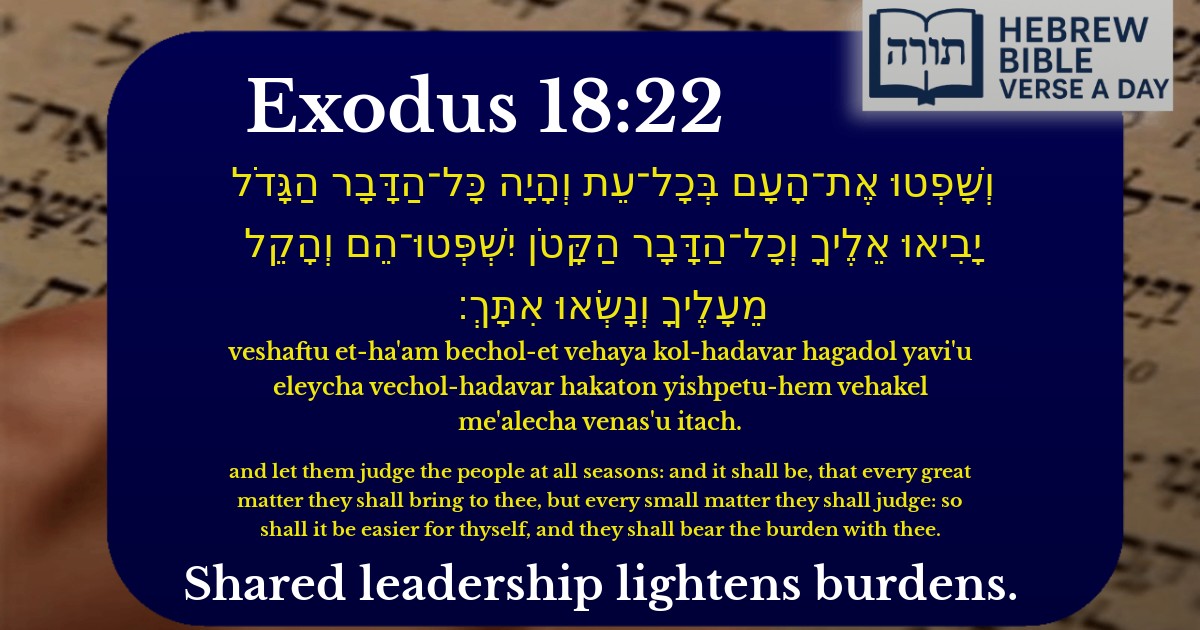Join Our Newsletter To Be Informed When New Videos Are Posted
Join the thousands of fellow Studends who rely on our videos to learn how to read the bible in Hebrew for free!
Hebrew Text
וְשָׁפְטוּ אֶת־הָעָם בְּכָל־עֵת וְהָיָה כָּל־הַדָּבָר הַגָּדֹל יָבִיאוּ אֵלֶיךָ וְכָל־הַדָּבָר הַקָּטֹן יִשְׁפְּטוּ־הֵם וְהָקֵל מֵעָלֶיךָ וְנָשְׂאוּ אִתָּךְ׃
English Translation
and let them judge the people at all seasons: and it shall be, that every great matter they shall bring to thee, but every small matter they shall judge: so shall it be easier for thyself, and they shall bear the burden with thee.
Transliteration
Veshaftu et-ha'am bechol-et vehaya kol-hadavar hagadol yavi'u eleycha vechol-hadavar hakaton yishpetu-hem vehakel me'alecha venas'u itach.
Hebrew Leining Text
וְשָׁפְט֣וּ אֶת־הָעָם֮ בְּכׇל־עֵת֒ וְהָיָ֞ה כׇּל־הַדָּבָ֤ר הַגָּדֹל֙ יָבִ֣יאוּ אֵלֶ֔יךָ וְכׇל־הַדָּבָ֥ר הַקָּטֹ֖ן יִשְׁפְּטוּ־הֵ֑ם וְהָקֵל֙ מֵֽעָלֶ֔יךָ וְנָשְׂא֖וּ אִתָּֽךְ׃
וְשָׁפְט֣וּ אֶת־הָעָם֮ בְּכׇל־עֵת֒ וְהָיָ֞ה כׇּל־הַדָּבָ֤ר הַגָּדֹל֙ יָבִ֣יאוּ אֵלֶ֔יךָ וְכׇל־הַדָּבָ֥ר הַקָּטֹ֖ן יִשְׁפְּטוּ־הֵ֑ם וְהָקֵל֙ מֵֽעָלֶ֔יךָ וְנָשְׂא֖וּ אִתָּֽךְ׃
🎵 Listen to leining
Parasha Commentary
📚 Talmud Citations
This verse is quoted in the Talmud.
📖 Sanhedrin 2a
The verse is referenced in the discussion about the appointment of judges and the delegation of judicial authority, illustrating the principle of distributing judicial responsibilities.
📖 Yoma 73b
The verse is cited in the context of discussing the roles and responsibilities of leaders and judges in the community, emphasizing the importance of shared leadership.


Context in the Torah
This verse (Shemot 18:22) appears in the context of Yitro advising Moshe on establishing a judicial system. Yitro observes that Moshe alone judges all disputes among Bnei Yisrael, which is unsustainable. He suggests delegating authority to capable leaders who can handle minor cases, while only major disputes are brought to Moshe.
Rashi's Explanation
Rashi explains that "every great matter" refers to difficult halachic questions that require deeper wisdom, while "every small matter" refers to straightforward monetary disputes or common legal cases. The phrase "וְהָקֵל מֵעָלֶיךָ" ("so shall it be easier for thyself") emphasizes that this delegation will prevent Moshe from becoming overwhelmed.
Rambam's Perspective
In Hilchot Sanhedrin (1:1), Rambam elaborates on this model, stating that a hierarchical court system is essential for Torah governance. Lower courts handle routine cases, while higher courts (like Moshe's) address complex halachic issues. This structure ensures accessibility and efficiency in justice.
Talmudic Insights
Midrashic Interpretation
The Mechilta (Yitro 2) notes that Yitro's advice was Divinely inspired, as Hashem wanted Moshe to focus on teaching Torah rather than settling every minor dispute. This highlights the importance of delegating communal responsibilities to qualified individuals.
Practical Halachic Application
This verse establishes the model for dayanim (judges) in Jewish communities throughout history. The Shulchan Aruch (Choshen Mishpat 1:1) codifies that every Jewish community must appoint qualified judges to adjudicate according to Torah law, following this biblical precedent.